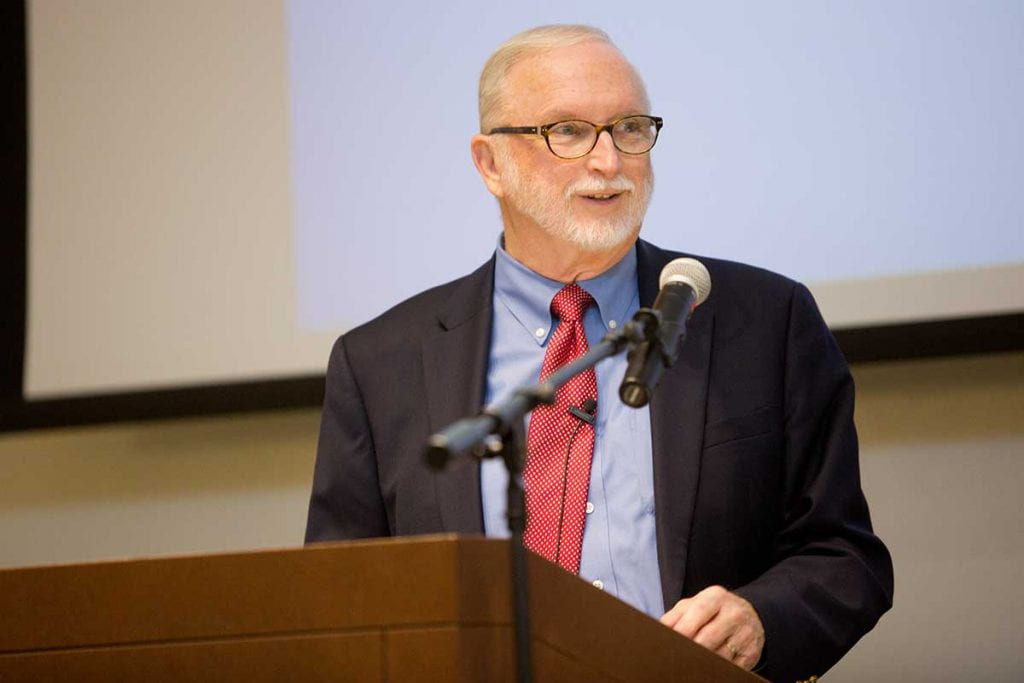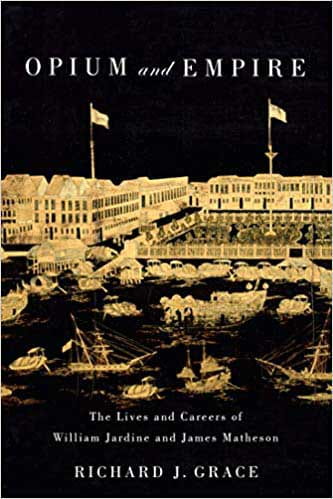May 19, 2022
Book by history professor Richard Grace, Ph.D. ’62 translated into Chinese

By Christopher Machado
Richard J. Grace, Ph.D. ’62, ’17Hon., professor emeritus of history, has been a distinguished presence at Providence College since the late 1950s — as a student and then as a beloved faculty member. A specialist in British history, the British empire, and World War II, Grace’s considerable scholarly talents were applied to writing and researching his first book, Opium and Empire: The lives and careers of William Jardine and James Matheson (McGill-Queens University Press, 2014), which was recently translated into Chinese.
The book explores the depths of opium merchants Jardine and Matheson, their complicated and sometimes inconsistent internal workings, and their achievements and failures. Grace details their decades-long journeys between Britain and China, their business strategies and standards of conduct, and their inventiveness as “gentlemanly capitalists.”
Here, Dr. Grace explains the genesis of the book, outlines its main characters, and describes what it means to have the book translated into Chinese.
What compelled you to write this book?
I became interested in the firm of Jardine Matheson many years ago when I was doing research on the British in China prior to World War II. That interest evolved into the biographical study of the firm’s founders, William Jardine and James Matheson, both of whom had studied medicine as young men in Scotland but wound up pursuing commercial careers in East Asia, with opium as one of their main commodities.

Who were Jardine and Matheson?
They were very different individuals. Jardine, older by a dozen years, was rather gruff but had sharp business instincts. Matheson was the more cosmopolitan, polished figure, eventually “Sir James Matheson” after being knighted by Queen Victoria for charitable assistance to famine relief along the west coast of Scotland in the mid-nineteenth century. Their business connections were established in the 1820s at Canton (Quangzhou), the only location where foreign trade was legally tolerated by the Chinese government. The firm of Jardine Matheson was formally established there in 1832.
They became the most prominent voices demanding better protection from the British government, as they resented the way British merchants were treated by the Chinese administration. Opium was a prohibited drug in China, so the firm conducted its trade offshore at large warehouse vessels where Chinese buyers would purchase quantities of the drug, which had come from India, and arrange to have it smuggled ashore. In 1839, after Jardine had sailed for England, the new imperial commissioner, Lin Zexu, took Matheson hostage and seized the firm’s entire inventory of opium. This eventuated in British action that came to be known as the First Opium War (1840-42).
I was initially drawn to study these two men because of the moral questions that were regularly raised, in their own time and by later historians, about the consequences of the opium which they marketed. It was not their only commodity by any means, but it was their most profitable. The book follows Jardine and Matheson through the rest of their lives, as members of Parliament and prominent business leaders in London. Jardine died in his fifties, but Matheson lived until nearly eighty, as laird of the Hebridean Island of Lewis, which he had purchased upon retiring from China after the war.
Was there anything that surprised you when you were conducting research for the book?
The thing that surprised me as I began writing the text was the way in which my knowledge of the two figures caused me to treat them as human beings rather than cardboard villains. Though I was not inclined to endorse their drug trade, I was ready to see them as persons with the full range of human emotions and internal conflicts.
Among the other surprises was the email I received one morning back in 2014 from a PC alum in Texas calling my attention to the favorable review that had appeared in that morning’s Wall Street Journal. That prompted me to start looking for the other reviews which were beginning to be published.
What does it mean to you to have the book translated into Chinese?
A year after the paperback edition was released (in 2015), McGill informed me that a Beijing publisher was interested in translating the book into Chinese. Over the course of two or three years, the book was reviewed very favorably around the world, but the very first review appeared in 2014 in The South China Morning Post (Hong Kong), with the reviewer describing it as “a rattling read with psychological heft.” Perhaps this is what helped to spark the interest of Beijing United Publishing. They contacted McGill and me and purchased the rights. I heard nothing about the translation for several years until my daughter Marianne (PC Class of 2002), who does freelance editing, discovered that the translation had been published in 2021.
As my field of history is modern Britain, the greatest number of reviews have been in British journals, and it has been gratifying to see the respect that it has received. I suspect that I shall never know how it is regarded in China in the new translation, as I do not speak or read Chinese, but just the fact that it was translated is a form of reward for the years of work that went into writing the book.





